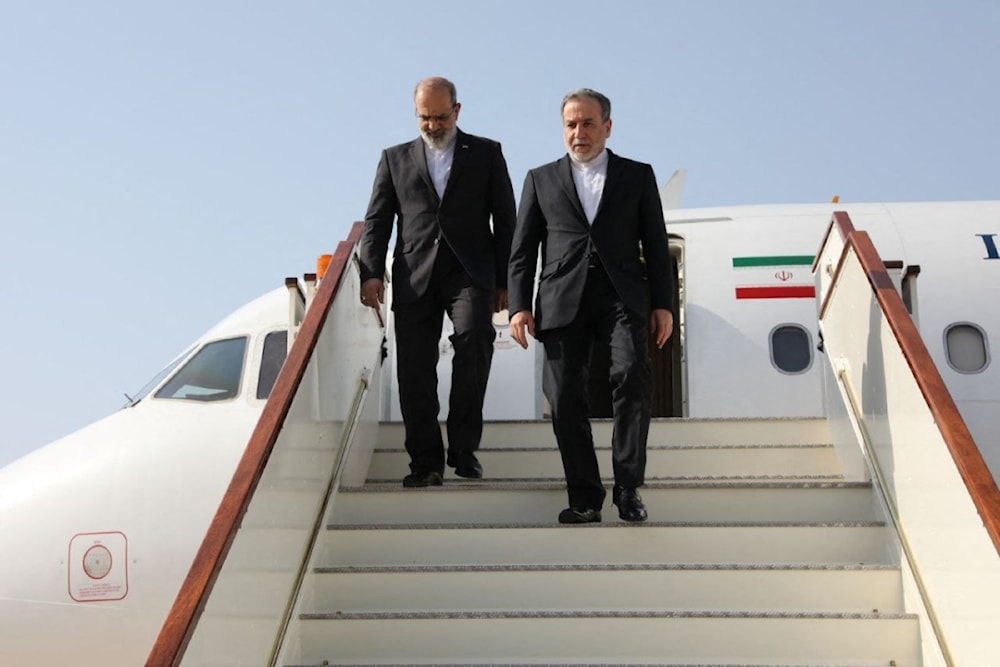Araghchi: 3rd round of US-Iran talks 'extremely serious, technical'
Iranian and American officials say the third round of indirect nuclear talks in Muscat focused on technical issues, with both sides saying the discussions were positive and productive.
-

This handout picture provided by the Iranian Foreign Ministry shows Iran's Foreign Minister Abbas Araghchi (R) descending the stairs of his plane upon his arrival in Muscat on April 25, 2025 (Photo by Iranian Foreign Ministry/AFP)
The third round of indirect talks between Iran and the United States in Muscat was more serious and practical than previous rounds, Iranian Foreign Minister Abbas Araghchi highlighted on Saturday, noting that the discussions had entered into technical details and moved away from general issues.
Araghchi and US Middle East envoy Steve Witkoff held a third round of indirect talks in Muscat, mediated by Omani officials, lasting approximately six hours.
This session came one week after a second round in Rome, which both sides had described as constructive.
Araghchi added that Iran had exchanged written messages with the American delegation several times through the Omani mediator and would conduct further assessments before the next round of talks.
Prior to the meeting between the lead negotiators, expert-level indirect discussions took place in Muscat to draft a framework for a potential nuclear agreement.
Araghchi pointed out that some disagreements over general matters persist, which will require further work to resolve in the upcoming stages.
'Seriousness and determination on both sides'
The Iranian FM expressed satisfaction with the talks process and its pace, emphasizing that the overall atmosphere is "positive and practical."
"The talks are extremely serious and technical ... there are still differences, both on major issues and on details," Araghchi told Iranian state TV.
"There is seriousness and determination on both sides ... However, our optimism about the success of the talks remains extremely cautious."
The Iranian Foreign Minister also noted that economic experts accompanied the Iranian delegation during this round, and experts from the Atomic Energy Organization of Iran are expected to join next week, reflecting a shift toward addressing more detailed aspects of the file.
"The presence of experts was beneficial ... we will return to our capitals for further reviews to see how disagreements can be reduced," Araghchi said.
An Iranian official familiar with the negotiations told Reuters earlier that the expert-level talks had been "difficult, complicated, and serious."
Araghchi stressed that the talks are exclusively focused on Iran’s nuclear program, without addressing any other issues, adding that the goal of the negotiations is "to build confidence about the peaceful nature of Iran's nuclear programme in exchange for sanctions relief."
He further confirmed that the next round of talks is scheduled for Saturday, May 3, in the Sultanate of Oman, affirming that the pace of negotiations is progressing well and gaining momentum amid a serious and determined atmosphere from both sides.
In this context, Iranian Foreign Ministry spokesman Esmaeil Baqaei said the exchange of views is ongoing through Omani mediation, particularly concerning the lifting of sanctions and reassuring the international community about the peaceful nature of Iran’s nuclear program.
Talks with Iran 'positive and productive', senior US official says
Additionally, a senior US administration official said the third round of nuclear talks with Iran was "positive and productive."
"There is still much to do, but further progress was made on getting to a deal," the official indicated, adding that the two sides agreed to meet again "soon", in Europe.
Earlier, Omani Foreign Minister Badr al-Busaidi announced that the meetings addressed the core principles, main objectives, and technical concerns.
He said that a fourth round is scheduled for next week, with the possibility of a "high-level meeting" taking place on May 3.
Trump believes US will make a deal with Iran
In an interview published Friday in Time magazine, US President Donald Trump said, "I think we're going to make a deal with Iran," while reiterating the possibility of military action if diplomacy fails.
Since February, Trump has reinstated a "maximum pressure" campaign against Tehran, having previously abandoned the 2015 nuclear agreement between Iran and six world powers in 2018 during his first term, subsequently reimposing crippling sanctions.
US Secretary of State Marco Rubio stated this week that under any prospective agreement, Iran would be required to completely cease uranium enrichment and instead import any enriched uranium needed to operate its sole functional nuclear power plant at Bushehr.
According to Iranian officials, Tehran is willing to negotiate certain restrictions on its nuclear activities in exchange for lifting sanctions. However, ending its enrichment program or relinquishing its enriched uranium stockpile remain among Iran’s "red lines" that are non-negotiable.
Additionally, several European diplomats said that European governments have suggested to US negotiators that a comprehensive agreement should also include restrictions preventing Iran from acquiring or developing the capacity to mount a nuclear warhead on a ballistic missile.
Tehran, however, maintains that its defense capabilities, including its missile program, are not up for negotiation.
An Iranian official familiar with the talks indicated on Friday that Tehran views its missile program as an even greater obstacle to reaching a deal.
Read more: Axios claims FM Araghchi proposes interim deal, Tehran denies

 5 Min Read
5 Min Read









